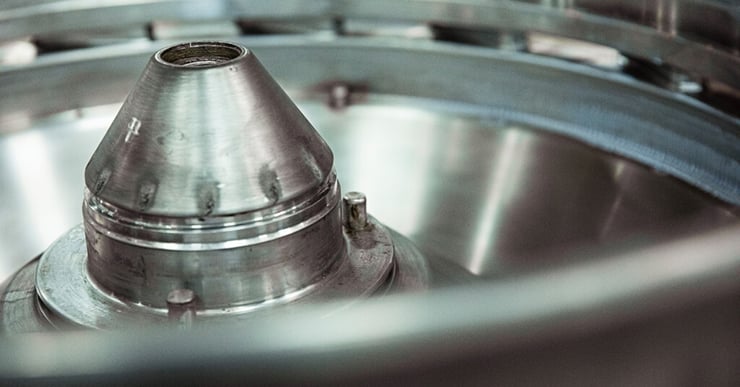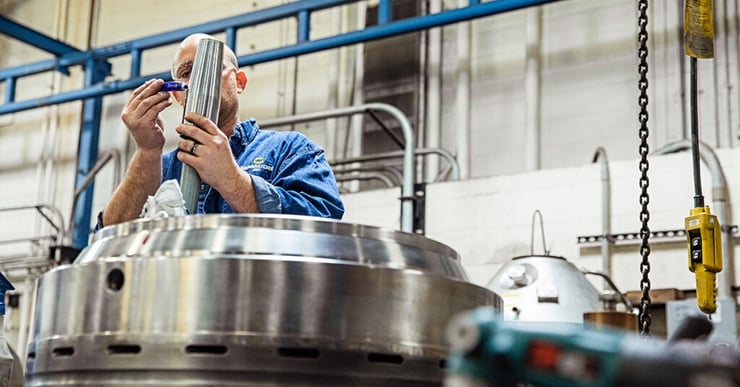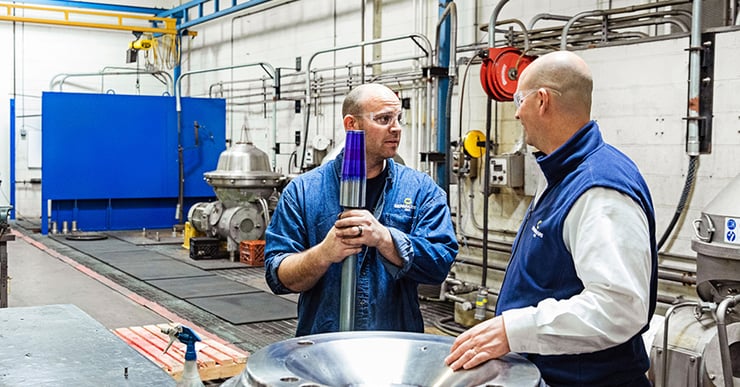A dirty centrifuge can cause a host of severe problems, ranging from product contamination to costly equipment damage.
But overcleaning your industrial centrifuge, or cleaning it with the wrong substances, can also cause costly equipment damage. So it’s crucial to find that regimented and well-informed middle ground. Otherwise, you might end up spinning into expensive repairs—and even more expensive equipment downtime.
For instance, certain solids have been known to cake unevenly onto the bowl of a food processing plant’s centrifuge over time. That can cause the bowl to become unevenly weighted, or out of balance. While this may not seem significant, it can cause the equipment to oscillate at high speeds.
You do not want your centrifuge to oscillate at high speeds.
There are three types of centrifuge cleaning: CIP cleaning, routine bowl cleaning, and top-end service cleaning. Here’s what you need to know about each.
Clean-In-Place (CIP) Cleaning
More than likely, your industrial centrifuge is connected inline to a CIP system; it’s meant to do light rinsing in between uses.
This “flushing” of the centrifuge is done with either clean water, or a mixture of chemicals that won’t wear down your equipment (we often caution customers about the chlorine content in water). In the latter case, you’ll need to replace that mixture every now and then — but you probably could have guessed that.
Your CIP will be the most common way you clean your equipment. Depending on what you’re centrifugating, you might run the cycle as frequently as once per day or even after each use.

Routine Bowl Cleaning
There are two critical things to pay attention to when it comes to routine bowl cleaning: how often you clean manually (if you need to at all), and what cleaning agents you’re using.
The frequency with which you clean your bowl manually will depend heavily on what you’re using your centrifuge for. And while everyone likes a good guessing game, this is something you’re going to want to get right with complete certainty.
The most important thing you can do for your centrifuge is consult a service expert like Separators. Service experts like us can help you pinpoint exactly when you’ll need to clean your bowl, whether that’s determined by a time frame, number of uses, or other factors entirely.

Once you’ve nailed down a clear set of guidelines detailing when to clean your bowl, you’ll still need to be meticulous about what you clean it with.
Corrosive agents are a dangerous double-edged sword. Any cleaning substance with a low pH (i.e. acidic substances) has a great deal of cleaning power, but will “chip away” at your equipment over time, both by slowly dissolving bonding materials and attacking the metal itself.
You should avoid using these corrosive agents if possible. And if you do need to use them in order to show that mess who’s boss, make sure to flush the centrifuge several times with your CIP system.
Under ordinary circumstances, you should use a cleaning solution with a neutral pH, such as something water-based or alcohol-based. And yes, elbow grease counts as a pH-neutral substance. Apply generously.
It never hurts to run your CIP afterwards, either!
Top-end Service Cleaning
Top-end service cleaning is actually just one small component of top-end service, otherwise known as minor service.
Don’t be fooled by the word “minor”, though. Unless you have a technician on your team who’s thoroughly trained on the ins and outs of your exact centrifuge (this is rare), you shouldn’t attempt top-end service internally. You’ll want to hire a third-party team of centrifuge technicians instead.
There are many different components to top-end service, but we’ll focus on the cleaning aspects here.
This process begins with a full disassembly of the bowl (yes, this is still considered “minor”). After that, your technician inspects the bowl, disc stacks, and centrifugal pumps, and cleans them to whatever extent is necessary.
Generally, experts recommend getting top-end service for your centrifuge once every six months. But much like your car, how often your equipment needs servicing depends almost entirely on how much you’re using it.
Facilities that operate their centrifuge around the clock will need top-end service cleaning far more often than facilities that only use the equipment for one or two cycles per day.
The best way to determine a top-end servicing schedule is to consult your provider; specialists like Separators, Inc. have seen it all, and our experience helps us to advise you on things like this.
Prepare for Service
Okay, this answer is kind of a cop-out. But the cold truth is that while the guidelines above will certainly help you, nothing you’ll find on the internet can teach you the ultra-specific cleaning needs of your plant’s particular high-speed vertical centrifuge.
Fortunately, we're here to help you figure them out—and more.
You don’t need to be an expert on your centrifuge. We take that burden off your shoulders, so that you can focus on the bigger picture needs of your plant, and still sleep easy at night knowing your centrifuge won’t cause problems. You just need to download our pre-maintenance checklist to help us prepare your equipment for cleaning.
Contact us today for more information, and let us take one more thing off your plate.

